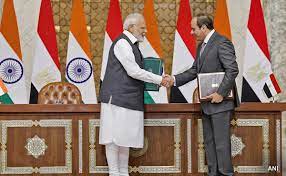A grand revival : on India-Egypt ties
India and Egypt have re-established close ties in recent years
The decision by India and Egypt to upgrade their ties to a Strategic Partnership during Prime Minister Narendra Modi’s meeting with Egypt President Abdel Fattah El-Sisi is a significant move for India’s ties with the West Asia-North Africa (WANA) region that is long overdue, given their historical ties. The two countries signed a Friendship Treaty in 1955, and India’s support to Egypt, including during the Suez Canal crisis in 1956, eventually led to the Non-Aligned Movement in 1961, with both as founder members. They were also instrumental in the G-77 grouping and “South-South Cooperation” initiatives. During the Cold War, India and Egypt were united over their desire not to become “ camp followers” of either the U.S. or the Soviet Union. More recently, their positions on the Ukraine war have been extremely similar — refusing to criticise Russia’s actions but not condoning them either and calling for a diplomatic resolution. Last year, India’s decision to supply wheat to Egypt, one of the world’s biggest importers that was hit by the blockade on exports from Russia and Ukraine last year, before the Black Sea Grain Initiative stepped in, won New Delhi much goodwill in Cairo. The two sides are also pursuing closer cooperation in green energy, pharmaceuticals and defence, with MoUs in agriculture, archaeology and antiquities, and competition law. Mr. Modi’s visit to the Al-Hakim Mosque and meeting with Egypt’s Grand Mufti appeared to be an attempt to dispel misgivings about his government’s policies towards the Muslim world.
President El-Sisi who was India’s Republic Day chief guest this year, conferred Egypt’s highest State Honour, “The Order of The Nile”, on Mr. Modi; it is given to world leaders and those “who offer Egypt or humanity invaluable services”. The two leaders will meet again as Egypt is a “special invitee” to the G-20 Summit in Delhi in September. The leaders appear to have spent much time focusing on multilateral issues, India’s close ties in Egypt’s neighbourhood (especially Israel and Saudi Arabia), food and energy security constraints, and building more cooperation with the Global-South including the African Union. In March, Egypt joined the “New Development Bank” set up by BRICS (Brazil-Russia-India-China-South Africa), and is keen to join this grouping that will deliberate new memberships at its Summit in Cape Town this August, where Egypt will seek India’s support. Bolstered by historical ties, and buffeted by present-day geopolitical turmoil, it is clear that India and Egypt are now essaying a closer relationship, one that looks both at future economies and autonomous foreign policies.
